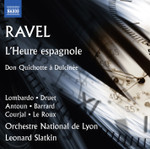|
Back
03/02/2016
Maurice Ravel: L’Heure espagnole, M.52 – Don Quichotte à Dulcinée, M.84
Luca Lombardo (Torquemada), Isabelle Druet (Concepción), Frédéric Antoun (Gonzalve), Marc Barrand (Ramiro), Nicolas Courjal (Don Inigo Gomez), François Le Roux (Don Quichotte), Orchestre National de Lyon, Leonard Slatkin (Conductor)
Recorded at Auditorium Maurice-Ravel, Lyon, France (January 22-26, 2013) – 55’42
Naxos # 8.660337 – Liner notes in French and English

   
This new Leonard Slatkin Naxos release comes on the heels of his earlier recording, L’Enfant et les sortilèges (Read here), featuring a full-blown Iberian theme though the CD doesn’t make as much of a monumental case as its predecessor. A strong argument can be made for the orchestral aspects and significant contributions within the vocal arena.
Both pieces highly dazzle with Ravel’s uncanny and innovative use of varying instruments. Slatkin has always been deeply drawn to this music. Perhaps the finesse Slatkin achieves in the Ravellian composition is due to his intercourse with not only classical but rock and folk groups for over 40 years. Exposure to vastly different genres enables Slatkin to better serve Ravel’s harmonic poetry with crisp detail: there are concise elements of refinement and subtle nuances.
It’s easier to engage L’Heure espagnole when two art forms are combined (one can’t help but think of the fabulous Maurice Sendak 1987 Glyndebourne Festival Opera production) and to discover the exponential brilliance in Ravel’s music. But Naxos can be commended in this audio recording using a cadre of accomplished singers.
Alongside Ravel’s sudden quixotic swells of music is a need for powerful vocal expression. Frédéric Antoun stands out as the most compelling, utilizing his silky-tenor timbre to broaden the indelible field of Gonzalve’s narcissistic attitude. Antoun’s offstage roulades are bright, clear and buttery, but nicely arrogant as well. Isabelle Druet’s Concepción convinces the listener of her anxiousness and uneasiness as she juggles several paramours without overstatement, and her “Oh! Pitoyable aventure!” serves up a respectful apportionment of opéra-bouffe and melodramatic élan. On the other hand, Luca Lombardo as Concepción’s husband, Torquemada, sings without adding extraneous fluff, but that’s perfectly suitable in this case. Dishing out a plateful of polite corpulent humor is Nicolas Courjal, having grand fun digging into his character, Don Inigo Gomez. The interpretation is strikingly funny while Marc Barrand keeps on the move, unflinching with his endless monotonous rounds of clock moving as the muleteer, Ramiro.
Ravel’s closing Don Quichotte à Dulcinée can be approached differently. While the album description “...François Le Roux who has the distinction of being considered the natural successor to Gérard Souzay...” has some elements of truth, the two styles are completely different. Le Roux’s pleasing baritone timbre tilts towards over affectedness and a vibrato that bites with stridency, and gets breathy in places (ref: “Chanson a boire”.) Maybe this technique is the sélection de choix Mr. Le Roux is attempting to achieve inside the petite triptych. But Mr. Gérard Souzay’s manner calms, yields unfiltered sincerity, gleams with polite and stately suppleness. In comparison to Le Roux’s, they are miles apart.
Leonard Slatkin’s L’Heure espagnole accomplishes, but it doesn’t jump out dramatically enough. In contrast, Don Quichotte à Dulcinée is excessive.
Christie Grimstad
|